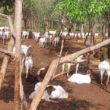Farmers have backed government’s move to restrict importation of fruits and vegetables.
In an interview, York Farm Technical Manager John Henderson said the decision was important as it was meant to promote the local agricultural industry.
“I don’t think it is wrong (to restrict imports), I think they’re trying to protect the Zambian market and what’s wrong with that, what is wrong with protecting Zambian jobs?” he asked.
Henderson said it was now up to farmers to respond by producing quality goods for the market.
He challenged other farmers to produce competitive products that could match imported products.
Henderson, however, observed that local farmers faced numerous challenges such as high production cost.
“Costs of production are high here because all our inputs are imported from South Africa or from outside Zambia,” he said.
He also said the education sector needed improving so that people were educated to understand that agriculture was a business.
“It is a big challenge that the government has got,” said Henderson.
Henderson said supplying to the local markets had its own challenges.
“We have challenges with seasonal production where there are glitches,” he said.
“They (supermarkets) have to realise that if they have to buy from a company like York Farm that produces safe quality vegetables they have to pay more.”
York Farm is a huge vegetable exporter which also produces wheat and flowers for both local and international markets.
Government banned the importation of some fruits and vegetables to promote production and grow the market for local farmers.
Some of the banned products are tomatoes, onions, carrots, mangoes, potatoes, pineapples, lemons and watermelons.
Ministry of Agriculture Permanent Secretary Julius Shawa said the ban follows numerous concerns by local farmers that the imported produce had a negative impact on their business.
“Just recently, we received complaints from farmers that some tomatoes from neighbouring Tanzania were being imported cheaply, undercutting our farmers,” said Shawa.
“Our concern as a ministry is that let us encourage the sourcing and supply of these products within the country, so we have imposed an administrative restriction for now.”












